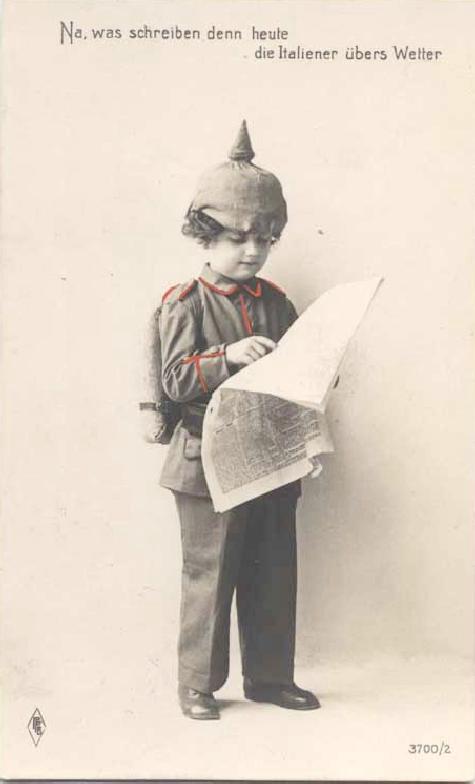
World War I: Italian Neutrality (1914-15)

Figure 1.-- The Germans and Austrians were furious that the Italians did not honor the terms of the Tripple Alliance and joint them in the War. The post card here reads, "Na, was schreiben denn heute die Italiener übers Wetter." That translates as something like, "Well, what will the Italians write about the weather today." We believe that the point was that the Italians were as changeable as the weather.
|
|
Italy when World War I broke out was a member of the Tripple Alliance. The Alliance required Italy to supporther allies, Germany and Austria-Hungary which were now at war. Italy did not, however, join her allies in World War I broke out (August 1914). The Italian Government had made this clear even before the War began after Austria had informed the Italians that they planed to take action agains the Serbs. The Austrians described the actions as defensive in character. The Italians differed on this and informed their allies as well as the British. [Giolitti] Italy temporized. Thus as the rest of Europe rushed toward war, Primeminister Antonio Salandra announced that Italy would not enter the War. Salandra claimed that the terms of the 1882 Tripple Alliance Treaty did not apply because neither Austria-Hungary or Germany were attacked. Salandra had many factors to consider. There was considerable opposition to the War in Italy. Also Italy did not have a great deal to gain. The territory that Italy most coveted was in Austrian hands. And Italy as a peninsula was much more exposed to Britain's principal military force--the Royal Navy. This was a decession of considerable importance. The Germany Army came very close to vistory in the West during 1914. If Italy had attacked France in the south, this might have meant a German victory in the west. Salandra was not sure how the Central Powers would react to his refusal to join them in the War. He thought that Austria-Hungary might attack Italy. As a result the Italian Army was concentrated on the border with Austria-Hungary. General Luigi Cadorna, Army Chief of Staff, oversaw the repositioning of the Army. The Germans and Austrians were furious, considering Italian neuttality a betrayal. They knew before the WAr broke out, however, that Italy would take this course. The military sitiation, however, did notnot permit any action against Italy. Salandra and the Minister of Foreign Affairs, Sidney Sonnino, were not pacifists. Their public statements focused on peace, but they initiated secret negotitions to see how Italy could profit from the War. They contacted both the Central Powers and the Allies to in essence determine who would make the best offer to Italy. Most of the Cabinet (including former Prime Minister Giovanni Giolitti) was strongly against entering the War. The same was true for the intellectual community, especially Socialists like Ivanoe Bonomi, Others like Leonida Bissolati and Benito Mussolini (a newspaper editor) came out for entering the War. The Nationalist and the Liberal parties supported intervention.
Sources
Giolitti, Giovanni. In Great Britain, Collected Diplomatic Correspondence, (London, 1915), p. 401.
CIH -- WW I

Navigate the CIH World War I Section:
[Return to Main World War I Italian page]
[Return to Main World War I country page]
[Return to Main World War I conduct page]
[Return to Main Italian page]
[About Us]
[Aftermath]
[Alliances]
[Animals]
[Armistace]
[Biographies]
[Causes]
[Campaigns]
[Casualties]
[Children]
[Countries]
[Declaration of war]
[Deciding factors]
-------[Diplomacy]
[Economics]
-------[Geo-political crisis]
[Home front]
[Intelligence]
[Military forces]
[Neutrality]
[Pacifism]
[People]
[Peace treaties]
[Propaganda]
[POWs]
[Russian Revolution]
[Terrorism]
[Trench warfare]
------[Technology]
[Weaponry]
[Bibliographies]
[Contributions]
[FAQs]
[Images]
[Links]
[Registration]
[Tools]
[Return to Main World War I page]
[Return to Main war essay page]
[Return to CIH Home page]
Created: 8:05 PM 12/6/2008
Last updated: 8:05 PM 12/6/2008



